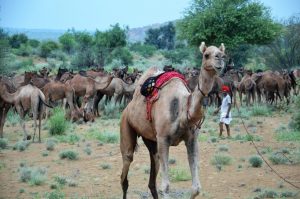Letter to FSSAI about camel milk fat standard
LPPS is one of the several organizations including Sahjeevan in Gujarat that are requesting a modification of the camel milk standards proposed by the Food Safety and Standrads Authority of India. It has written a letter to that effect, stating
“We are extremely concerned that the standard for camel milk has been set at 3% fat content, since camel milk fat content in India can naturally be as low as 1.9% fat, especially at the end of the dry season. Our own controlled tests of camel milk produced in our part of Rajasthan have shown that fat content fluctuates between 1.9 and more than 4% throughout the year and depending on the forage consumed by camels. We believe the research of the National Research Centre on camels has come up with the same results.”
The letter also refers to the authoritative work on camel milk by the Food and Agriculture Organization FAO which indicates that in drought conditions, fat content can be as low as 1,1 %.
LPPS sincerely hopes that the FSSAI will quickly modify its standrad for the benefit of both camel breeders and consumers who are least concerned about fat content and mainly require pure and unadulterated camel milk that lives up to its medicinal properties for many autistic children.
See this blog by Dr. Ilse Köhler-Rollefson on how LPPS is establishing a back-tracking system to ensure delivery of unadulterated camel milk to its customers and an article in National Geographic magazine about the importance of developing a camel dairy sector in Rajasthan for the state’s nomadic Raika.




